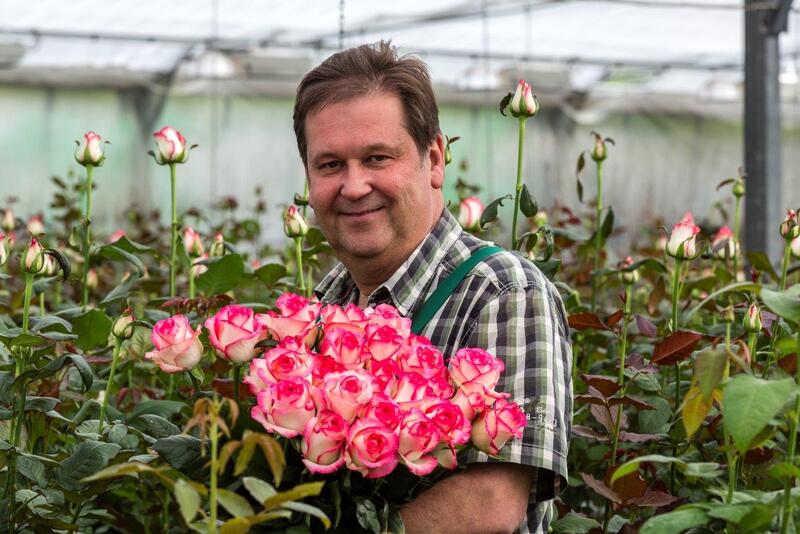
Every day, Rudi and Ulrike Attenberger welcome more than 150 customers to their company in Recklinghausen, a city in the north-east of the German Ruhr area. Most of those customers leave with one or more bouquets of organic roses or a healthy new shrub for their garden. Koppert's predatory mite Amblydromalus limonicus has contributed to the company’s success.
In 1997, Rudi and Ulrike Attenberger took over the rose cultivation farm owned by Ulrike's father. Their company, Rosen Sabrowski – where their daughter also works – has since become a household name. Seventy per cent of their products is sold directly to consumers, who are familiar with the company. The remaining thirty per cent is sold to wholesalers and then makes its way to the market.
Pioneers in beneficials
The Attenbergers have been focusing on biological crop protection since 2003. But this isn't an easy decision for a company like theirs. They grow 21 different cultivars under 7,000 m2 of glass, each with its own sensitivity to pests like thrips and whitefly. Sabrowski Rosen is also one of the few rose growers in Germany that uses assimilation lighting. This is why pests can also be found in the winter, making beneficials indispensable.
'Beneficials were a relatively new thing in 2003,' explains Rudi. 'We were the first in Germany to start using them on roses. We were true pioneers, having to research everything on our own.'
Limonicus extremely effective
Despite the company's experience with biological crop protection, California thrips became a real problem in 2014 and 2015. The damage caused by this pest was enormous, which prompted Rudi to test the predatory mite Amblydromalus limonicus or Limonica in one of the sections in his company. However, the thrips infestation proved too great between 2014 and 2016, forcing Rudi to use chemicals.
Now, in 2017, Limonica has proven to be highly effective. Rosen Sabrowski uses the beneficial early in the season, with a dosage of 25 beneficials per square metre every fourteen days. During the summer months he increases this to 37.5, returning to 25 per square metre in October.
Thrips and whitefly
'The beneficials are extremely effective in a crop with a serious thrips infestation,' explains Rudi. 'The predatory mite is easy to find, as it reproduces quickly. Of course, you never really get rid of thrips entirely; we still find some California thrips lower down in the crop, but never in the flowers. They stay completely clean, even in a highly sensitive cultivar like White Naomi!'
One important advantage of Limonica is that it also combats whitefly.
Given that Rudi also uses other beneficials, he's in the perfect position to make a comparison with Limonica. The predatory mites are also useful for combating whitefly. 'In one of our departments we used Encarsia formosa, Delphastus catalinae, and chemical products, but the results were much better with Limonica.'
Quick population growth
Rudi also uses the predatory mite Amblyseius swirski to combat thrips and whitefly, although Limonica does a better job at this company than swirski. 'If I use thirty swirski mites, I'll find thirty-five two weeks later. With Limonica, I'll find double that in two weeks' time. Limonica is also more active at lower temperatures. All in all, it's very effective against both thrips and whitefly. We didn't expect this result. One time, however, we had to use some NeemAzal to correct the situation.’
Long vase life
The Attenbergers grow their roses almost entirely organically, which improves their quality. 'If our customers treat the roses well, they have a vase life of ten to fourteen days. This is unheard of for roses from Kenya or Ethiopia, which wilt after five or six days.'
The two entrepreneurs obtain a lot of their knowledge from the Netherlands. One of their company advisers is Geert van Wijlick from Mertens Tuinbouw, who visits the company every three weeks. Alongside van Wijlick, Attenberger works with Dutch consultant Ton Bakker. 'You want to avoid having tunnel vision,' explains Rudi. 'We work in the greenhouses every day, which means we don't notice crop changes as quickly. An expert has a fresh take on things and picks up on changes more quickly. The help and experience of an expert is invaluable.'